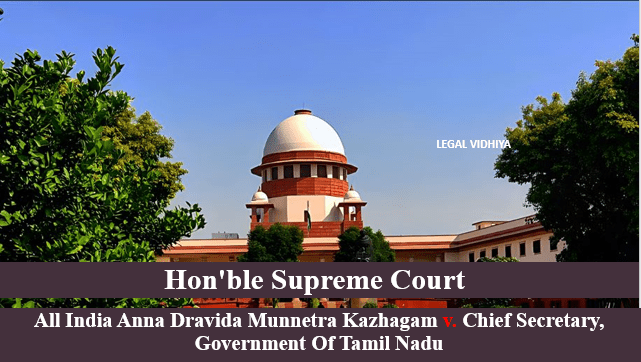
| Citation | 2009 (5) SCC 452 |
| Date | 1 April 2009 |
| Court | The Supreme Court Of India |
| Case Type | Contempt Petition No. 262 of 2007 |
| Bench | B.N. Agrawal, G.S. Singhvi |
| Appellant | All India Anna Dravida Munnetra Kazhagam |
| Respondent | Chief Secretary Of Tamil Nadu & Ors. |
| Referred | The Contempt Of Courts Act, 1971, The Constitution Of India 1950. |
Facts Of The Case-
The petitioner lodged a petition numbered 31435 of 2007 before the Madras High Court on September 26th, 2007. They sought a declaration that the call, for a bandh (shutdown) and its execution in Tamil Nadu either on October 1st, 2007 or any other date by parties referred to as Respondents 3 7 violated Articles 19 and 21 of the Indian Constitution. Additionally they claimed it contravened the directive principles of State policy and fundamental duties outlined in the Constitution of India. The petitioner also requested a measure to prohibit the respondents from proceeding with their proposed bandh in Tamil Nadu on October 1st or any other date as, per their resolution passed during a meeting held on September 24th, 2007.
Issues Involved-
Was the call, for a bandh in the State of Tamil Nadu by parties, against the rights guaranteed under the Constitution of India?
Judgement-
The High Court carefully reviewed the courts decision in the case of Communist Party of India (M). Made an initial finding that the political parties call was, for a bandh, not a strike or hartal as they had claimed. The court accepted the writ petition set a date by 24 10 2007 and scheduled the case to be heard at 2.30 p.m. On that day. Additionally the court ordered that there should be a police presence in the city throughout this period. The Supreme Court thoroughly examined all aspects of the matter served notices, to those who did not appear and issued an order. The court stated that there is a difference, between calling for a bandh and calling for a strike. The court noted that political party leaders who call for a bandh cannot avoid responsibility by claiming they did not directly instruct citizens to engage in activities. However if some participants in the bandh do engage in activities they can be held accountable. The court also observed the increasing frequency of bandhs being called, held and enforced in the state resulting in damage to private property. Additionally the court affirmed its authority to provide relief to the petitioners in the presence of the political party respondents. Consequently the court granted relief as requested in the petitions. Issued notices, to non appearing respondents.
This Article is written by Saurabh Sharma, A student Of Vivekananda Institute Of Professional Studies, Intern At Legal Vidhiya.




0 Comments